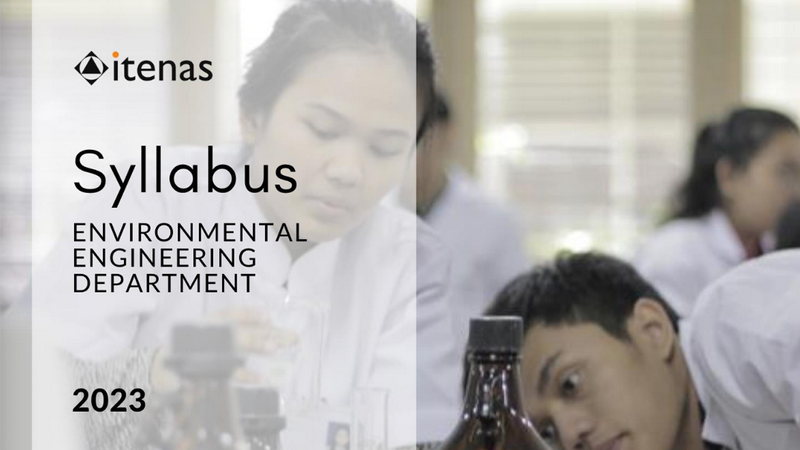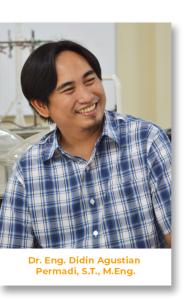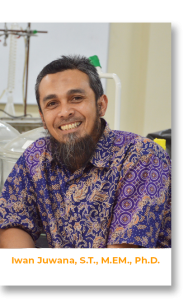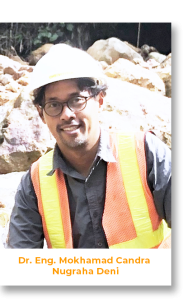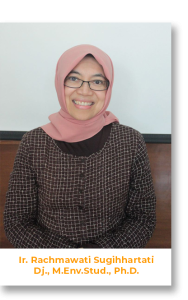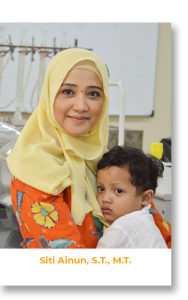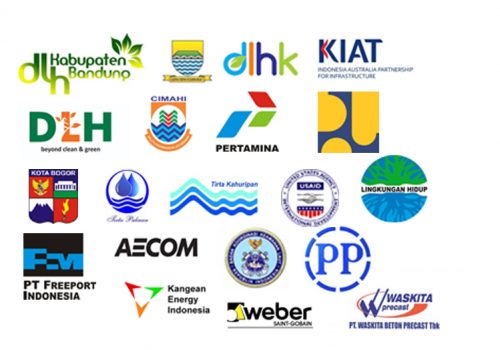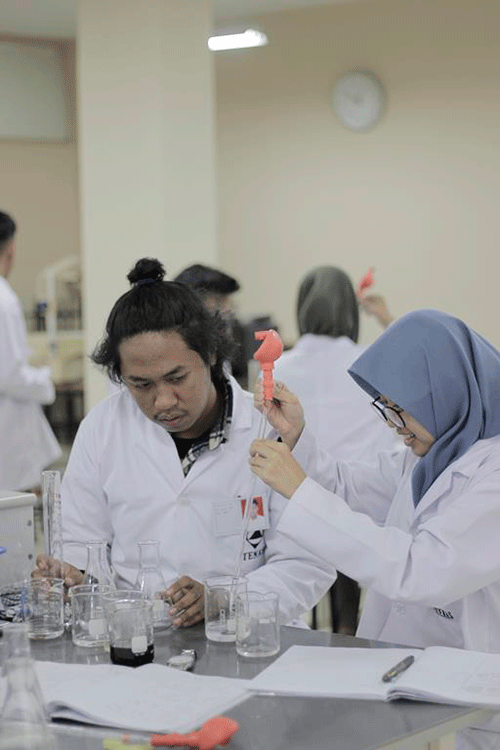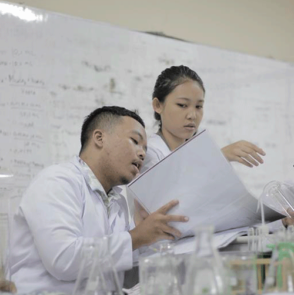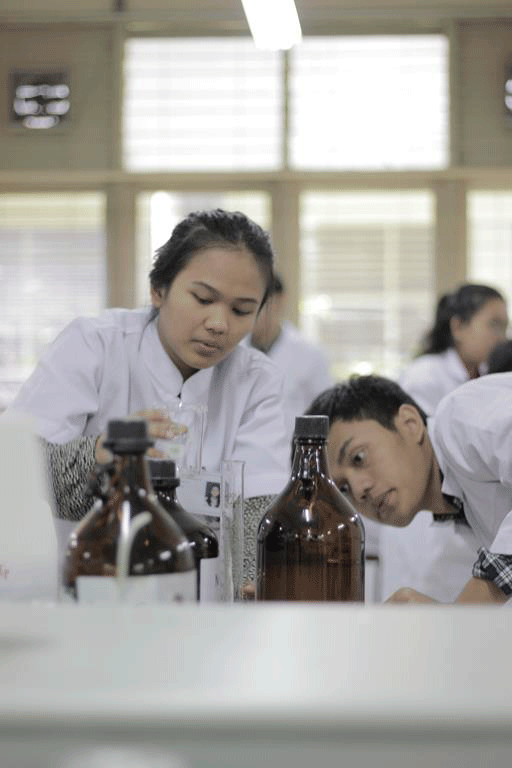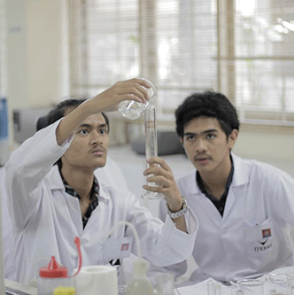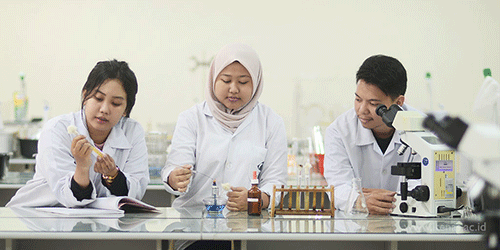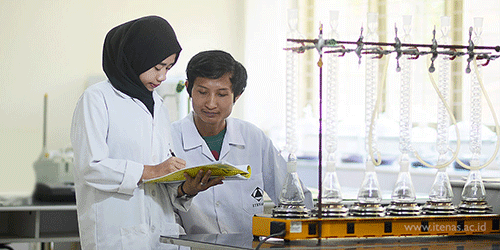ENVIRONMENTAL ENGINEERING
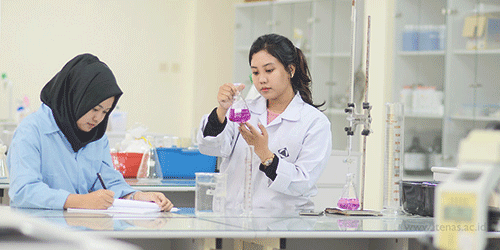
Itenas Environmental Engineering major prepares students to become graduates who are concerned about the environment and have the competence to be able to provide analysis and solutions to various global environmental problems as well as to be able to participate in realizing environmental improvement by being provided with planning, implementation and management expertise and competence in the field of water management, industrial hygiene, occupational health and safety, solid waste management, environmental quality management, air pollution, and others supported by engineering and entrepreneurship so that graduates can foster and develop an independent attitude and are ready to work in teams.
Besides, Itenas’ Environmental Engineering major specifically generates graduates who are experts in water and waste management, producing work that is oriented to minimizing the use of resources and minimizing the waste produced, strengthening community participation to contribute to sustainable development, and strengthening cooperation networks with stakeholders in the field of processing technology, also the water and waste management. Those aspects make Itenas’ Environmental Engineering major graduates excel in those fields based on resource recovery in supporting sustainable development following the 2030 Sustainable Development Goals (SDGs) targets.
“To develop knowledge and its application in management, control, and improvement of environmental quality with resource recovery-based environmental techniques and technologies.”
- The outcomes of the learning are the graduates have the ability to:
1. Project love for motherland, good morals, ethics, and personality in completing tasks and prioritizing the interests of the nation and the wider community.
2. Work together, have social sensitivity, and have a high concern for the diversity of society and the environment.
3. Apply the basic principles of theoretical concepts in science, applications of engineering mathematics, engineering principles/fundamentals, and engineering science.
4. Design and conduct both laboratory and on-field experiments to analyze and interpret data as a basis for providing solutions to environmental problems.
5. Apply the basic principles of environmental control technologies and the environmental pollution prevention process, and master the concept of its application.
6. Design in the field of Environmental Engineering through an integrated system approach.
7. Apply innovative environmental technology to prevent, control, and solve environmental pollution.
8. Make a quick and precise decision from the knowledge of sustainable development.
9. Communicate in Indonesian and English fluently, both verbally and written.
10. Initiate entrepreneurship in the field of Environmental Engineering.
11. Work innovatively and do lifelong learning to encounter challenges and uncertainties toughly.
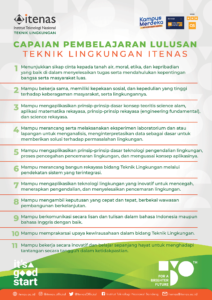
In 2022, the outcomes are the graduates have the ability to:
1. Project their piety to God Almighty, moral and ethical, and love for the motherland to complete assignments in the field of Environmental Engineering.
2. Work together, have social sensitivity, and have a high concern for the diversity of society and the environment.
3. Apply the basic principles of natural science, mathematics, engineering mathematics, engineering, and environmental health.
4. Design and conduct both laboratory and on-field experiments to analyze and interpret data as a basis for providing solutions to environmental problems.
5. Analyze and solve environmental problems by applying the basic principles of environmental management based on resource recovery.
6. Design in the field of Environmental Engineering through a resource recovery approach.
7. Apply the latest environmental technology devices, methods, and skills.
8. Make a quick and precise decision from the knowledge of sustainable development and skilled in managing tasks.
9. Communicate in Indonesian and English fluently, both verbally and written.
10.Initiate entrepreneurship in the field of Environmental Engineering.
11.Work innovatively and keep up with the latest developments in science and technology (IPTEK) as well as lifelong learning.
Excellence in environmental management and technology based on resource recovery in supporting sustainable development.
| COURSES | |
NAME | CREDITS | |
| ||
Semester I |
| |
TLA-101 | Pancasila | 2 |
TLA-103 | Introduction to Environmental Engineering | 2 |
TLA-105 | English I | 2 |
TLA-107 | Environmental Physics | 3 |
TLA-109 | Mathematics I | 3 |
TLA-111 | Basic Chemistry | 4 |
TLA-113 | Indonesian Language | 2 |
| Total | 18 |
| ||
Semester II |
| |
TLA-102 | Environmental Chemistry | 3 |
TLA-104 | Environmental Statistics | 3 |
TLA-106 | Environmental Microbiology | 3 |
TLA-108 | Mathematics II | 3 |
TLA-110 | Introduction to Surveying and Geographical Information | 2 |
TLA-112 | Civics | 2 |
TLA-114 | English II | 2 |
| Total | 18 |
| ||
Semester III |
| |
TLA-201 | Environmental Quality Measurement and Analysis I | 2 |
TLA-203 | Engineering and Structural Mechanics | 3 |
TLA-205 | Engineering Mathematics | 2 |
TLA-207 | Hydrology and Water Resources | 3 |
TLA-209 | Environmental Health | 2 |
TLA-211 | Fluid Mechanics I | 3 |
TLA-213 | Engineering Drawing I | 2 |
| Total | 17 |
| ||
Semester IV |
| |
TLA-202 | Environmental Quality Measurement and Analysis II | 3 |
TLA-204 | Introduction to Soil Mechanics | 2 |
TLA-206 | Plumbing and Instrumentation Equipment | 3 |
TLA-208 | Environmental Engineering Operations Unit | 3 |
TLA-210 | Environmental Epidemiology | 2 |
TLA-212 | Fluid Mechanics II | 3 |
TLA-214 | Engineering Drawing II | 2 |
| Total | 18 |
| ||
Semester V |
| |
TLA-301 | Drinking Water Supply Engineering | 3 |
TLA-303 | Environmental Engineering Process Unit | 3 |
TLA-305 | Waste Management | 3 |
TLA-307 | Environmental Drainage | 3 |
TLA-309 | Air Pollution | 3 |
TLA-311 | Occupational Health and Safety | 2 |
| ||
Semester V Elective Courses |
| |
TLA-351 | Environmental Audit | 2 |
TLA-353 | Environmental Law and Policy | 2 |
TLA-355 | Noise Control | 2 |
| Total | 19 |
| ||
Semester VI |
| |
TLA-352 | Occupational Health and Safety Management System | 2 |
TLA-354 | Garbage Collection and Transport Techniques | 2 |
TLA-356 | Waste Recycling and Utilization | 2 |
| Total | 18 |
| ||
Semester VI Elective Courses |
| |
TLA-352 | Sistem Manajemen Kesehatan dan Keselamatan Kerja | 2 |
TLA-354 | Teknik Pengumpulan dan Pengangkutan Sampah | 2 |
TLA-356 | Daur Ulang & Pemanfaatan Limbah | 2 |
| Total | 18 |
| ||
Semester VII |
| |
TLA-401 | Wastewater Treatment Design | 4 |
TLA-403 | Basic Design and Research | 2 |
TLA-405 | Waste Final Processing Design | 3 |
TLA-490 | Job Training | 2 |
TLA-407 | Hazardous and Industrial Waste Treatment | 3 |
TLA-409 | Entrepreneurship | 2 |
| ||
Semester VII Elective Courses |
| |
TLA-451 | Environmental Toxicology | 2 |
TLA-453 | Air Quality Management | 2 |
TLA-455 | Environmental Economics and Valuation | 2 |
| Total | 18 |
| ||
Semester VIII |
| |
TLA-402 | Environmental Impact Analysis | 3 |
TLA-404 | Religion | 2 |
TLA-499 | Teknologi Lingkungan Tepat Guna | 3 |
TLA-500 | Final Assignment | 6 |
| ||
Semester VIII Elective Courses |
| |
TLA-452 | Waste and Renewable Energy | 2 |
TLA-454 | Environmental Engineering Modeling | 2 |
TLA-456 | Industrial Ecology | 2 |
| Total | 18 |


